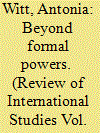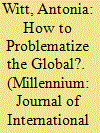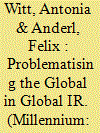|
|
|
Sort Order |
|
|
|
Items / Page
|
|
|
|
|
|
|
| Srl | Item |
| 1 |
ID:
187030


|
|
|
|
|
| Summary/Abstract |
International organisations (IOs) are said to command growing levels of authority. But in studying this phenomenon, scholars predominantly focus on the formal capacities member states assign to IOs. Much less attention is paid to the effects of IO authority, that is, how authority is exerted in practice and what it does within the affected societies. Based on a case study of the African Union's (AU) anti-coup regime, I make the case for a ‘bottom-up’ approach to IO authority, focusing on its localised enactment and effects. Analysing the AU's authority through a governmentality lens and drawing on several months of field research, I show that the AU's authority to govern coups is indeed effective: in commanding the re-establishment of constitutional order, the AU prescribes a particular imaginary of political order to resolve conflict and shapes the conduct of political actors in affected states by inscribing them into this order. But rather than operating in a top-down, direct way, the AU's authority is enacted in a distant, diffuse manner. Although based on formal powers assigned to the AU, neither the way this authority is exercised nor its effects can be inferred merely from these formal powers.
|
|
|
|
|
|
|
|
|
|
|
|
|
|
|
|
| 2 |
ID:
192191


|
|
|
|
|
| Summary/Abstract |
International Relations (IR) has long been criticized for taking a particular (Western) experience as basis for formulating theories with claim to universal validity. In response, recent discussions have therefore centered on making IR ‘truly global’, that is, more inclusive and less parochial in its language and substance. But the concept of the global underpinning this discussion is both illusive and strongly contested. It requires problematization. But how? In this Forum, scholars discuss this question with a forward-looking agenda. Building on recent critical engagements with the question of the global as a concept in general and Global IR specifically, the authors ask how the global should be problematized in order to achieve a (more) progressive agenda for IR. They draw on different regional and disciplinary perspectives to both further the agenda of a less exclusive and racist discipline without falling into the trap of shallow inclusivity, and to discuss ways of problematizing the global without falling back into nativism or nationalism.
|
|
|
|
|
|
|
|
|
|
|
|
|
|
|
|
| 3 |
ID:
176019


|
|
|
|
|
| Summary/Abstract |
International Relations (IR) has long been criticised for taking a particular (Western) experience as basis for formulating theories with claim to universal validity. ‘Non-Western’, ‘post-Western’, and postcolonial theories have been criticising the problem of Western parochialism and have developed specific strategies of changing IR. Global IR has taken up some of these concerns and aims at changing the discipline by theorising international politics as multiplex, taking different experiences, histories, and agencies into account. Yet, we argue that this agenda rests on a partial reading of IR’s critics, failing to take seriously the epistemological and methodological critiques of IR and therefore perpetuating some of the discipline’s ‘globalisms’. Therefore, first, Global IR reifies the idea of a truly universal body of knowledge. The global is logically prior to this as an imagined space of politics and knowledge. Second, Global IR assumes that scholars around the world aspire and are able to contribute to a single body of knowledge. While reifying these globalisms, Global IR fails to ask where this global imaginary comes from and what its effects are on the distribution of power and wealth. We argue that instead of assuming ‘the global’ as descriptive category, a more substantial and reflexive critique of IR’s exclusionary biases should start from reconstructing these globalisms and their effects.
|
|
|
|
|
|
|
|
|
|
|
|
|
|
|
|
|
|
|
|
|